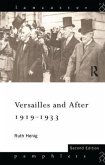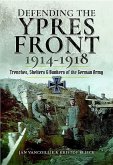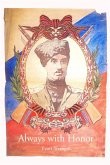War in Peace
Paramilitary Violence in Europe After the Great War
Herausgeber: Gerwarth, Robert; Horne, John
War in Peace
Paramilitary Violence in Europe After the Great War
Herausgeber: Gerwarth, Robert; Horne, John
- Gebundenes Buch
- Merkliste
- Auf die Merkliste
- Bewerten Bewerten
- Teilen
- Produkt teilen
- Produkterinnerung
- Produkterinnerung
Explains why, in many parts of Europe, the end of the Great War brought not peace but continued conflict. Contributes to an understanding of the difficult transition from war to peace and shows how paramilitary violence helped legitimize both fascism and communism, and also many of the new nation-states that emerged from the Great War.
Andere Kunden interessierten sich auch für
![The Search for Negotiated Peace The Search for Negotiated Peace]() David S PattersonThe Search for Negotiated Peace210,99 €
David S PattersonThe Search for Negotiated Peace210,99 €![Versailles and After, 1919-1933 Versailles and After, 1919-1933]() Ruth HenigVersailles and After, 1919-1933181,99 €
Ruth HenigVersailles and After, 1919-1933181,99 €![Defending the Ypres Front 1914 - 1918 Defending the Ypres Front 1914 - 1918]() Jan VancoillieDefending the Ypres Front 1914 - 191840,99 €
Jan VancoillieDefending the Ypres Front 1914 - 191840,99 €![Always with Honor Always with Honor]() Pyotr WrangelAlways with Honor17,99 €
Pyotr WrangelAlways with Honor17,99 €![British Expeditionary Force - Advance to Victory British Expeditionary Force - Advance to Victory]() Andrew RawsonBritish Expeditionary Force - Advance to Victory28,99 €
Andrew RawsonBritish Expeditionary Force - Advance to Victory28,99 €![American Historians in War and Peace American Historians in War and Peace]() Jonathan M NielsonAmerican Historians in War and Peace90,99 €
Jonathan M NielsonAmerican Historians in War and Peace90,99 €![The Origins of the First World War The Origins of the First World War]() William MulliganThe Origins of the First World War93,99 €
William MulliganThe Origins of the First World War93,99 €-
-
-
Explains why, in many parts of Europe, the end of the Great War brought not peace but continued conflict. Contributes to an understanding of the difficult transition from war to peace and shows how paramilitary violence helped legitimize both fascism and communism, and also many of the new nation-states that emerged from the Great War.
Hinweis: Dieser Artikel kann nur an eine deutsche Lieferadresse ausgeliefert werden.
Hinweis: Dieser Artikel kann nur an eine deutsche Lieferadresse ausgeliefert werden.
Produktdetails
- Produktdetails
- Verlag: Oxford University Press (UK)
- Seitenzahl: 256
- Erscheinungstermin: 12. Dezember 2012
- Englisch
- Abmessung: 236mm x 155mm x 23mm
- Gewicht: 431g
- ISBN-13: 9780199654918
- ISBN-10: 0199654913
- Artikelnr.: 39395836
- Herstellerkennzeichnung
- Libri GmbH
- Europaallee 1
- 36244 Bad Hersfeld
- gpsr@libri.de
- Verlag: Oxford University Press (UK)
- Seitenzahl: 256
- Erscheinungstermin: 12. Dezember 2012
- Englisch
- Abmessung: 236mm x 155mm x 23mm
- Gewicht: 431g
- ISBN-13: 9780199654918
- ISBN-10: 0199654913
- Artikelnr.: 39395836
- Herstellerkennzeichnung
- Libri GmbH
- Europaallee 1
- 36244 Bad Hersfeld
- gpsr@libri.de
Robert Gerwarth was born in Berlin and educated at Oxford where he also held a British Academy Postdoctoral Fellowship. He has been Professor of Modern History at University College Dublin and Director of UCD's Centre for War Studies since 2009. He is the author of several monographs and edited books on modern European history, most recently of a biography on Reinhard Heydrich. John Horne was educated in Australia and Britain, and has taught modern European history for many years at Trinity College Dublin. He has published extensively on French history and on the comparative and transnational history of the Great War. He is a member of the board of the Centre for Research at the Historial de la Grande Guerre, Péronne, a founder member of EurohistXX, the research consortium in contemporary European history, and a member of the Royal Irish Academy.
* 1: Robert Gerwarth and John Horne: Paramilitarism in Europe after the
Great War: An Introduction
* Part I: Revolution and Counter-Revolution
* 2: William Rosenberg: Revolution and Counter-Revolution: The Syndrome
of Violence in Russia's Civil Wars, 1918-1920
* 3: Robert Gerwarth and John Horne: Bolshevism as Fantasy: Fear of
Revolution and Counter-Revolutionary Violence, 1917-23
* 4: Robert Gerwarth: Fighting the Red Beast: Counterrevolutionary
Violence in the Defeated States of Central Europe
* 5: Marko Tikka and Pertty Haapala: Revolution, Civil War, and Terror
in Finland in 1918
* 6: Emilio Gentile: Paramilitary Violence in Italy: the Rationale of
Fascism and the Origins of Totalitarianism
* Part II: Nations, Borderlands, and Ethnic Violence
* 7: Serhy Yekelchyk: Bands of Nation Builders? Insurgency and Ideology
in the Ukrainian Civil War
* 8: Tomas Balkelis: Turning Citizens into Soldiers: Baltic
Paramilitary Movements after the Great War
* 9: John Paul Newman: Paramilitary Violence in the Balkans: Origins
and Legacies
* 10: Ugur Ümit Üngör: Paramilitary Violence in the Collapsing Ottoman
Empire
* 11: Julia Eichenberg: Soldiers to Civilians, Civilians to Soldiers:
Poland and Ireland after the First World War
* 12: Anne Dolan: The British Culture of Paramilitary Violence in the
Irish War of Independence
* 13: John Horne: Defending Victory: Paramilitary Politics in France,
1918-26. A Counter-example
Great War: An Introduction
* Part I: Revolution and Counter-Revolution
* 2: William Rosenberg: Revolution and Counter-Revolution: The Syndrome
of Violence in Russia's Civil Wars, 1918-1920
* 3: Robert Gerwarth and John Horne: Bolshevism as Fantasy: Fear of
Revolution and Counter-Revolutionary Violence, 1917-23
* 4: Robert Gerwarth: Fighting the Red Beast: Counterrevolutionary
Violence in the Defeated States of Central Europe
* 5: Marko Tikka and Pertty Haapala: Revolution, Civil War, and Terror
in Finland in 1918
* 6: Emilio Gentile: Paramilitary Violence in Italy: the Rationale of
Fascism and the Origins of Totalitarianism
* Part II: Nations, Borderlands, and Ethnic Violence
* 7: Serhy Yekelchyk: Bands of Nation Builders? Insurgency and Ideology
in the Ukrainian Civil War
* 8: Tomas Balkelis: Turning Citizens into Soldiers: Baltic
Paramilitary Movements after the Great War
* 9: John Paul Newman: Paramilitary Violence in the Balkans: Origins
and Legacies
* 10: Ugur Ümit Üngör: Paramilitary Violence in the Collapsing Ottoman
Empire
* 11: Julia Eichenberg: Soldiers to Civilians, Civilians to Soldiers:
Poland and Ireland after the First World War
* 12: Anne Dolan: The British Culture of Paramilitary Violence in the
Irish War of Independence
* 13: John Horne: Defending Victory: Paramilitary Politics in France,
1918-26. A Counter-example
* 1: Robert Gerwarth and John Horne: Paramilitarism in Europe after the
Great War: An Introduction
* Part I: Revolution and Counter-Revolution
* 2: William Rosenberg: Revolution and Counter-Revolution: The Syndrome
of Violence in Russia's Civil Wars, 1918-1920
* 3: Robert Gerwarth and John Horne: Bolshevism as Fantasy: Fear of
Revolution and Counter-Revolutionary Violence, 1917-23
* 4: Robert Gerwarth: Fighting the Red Beast: Counterrevolutionary
Violence in the Defeated States of Central Europe
* 5: Marko Tikka and Pertty Haapala: Revolution, Civil War, and Terror
in Finland in 1918
* 6: Emilio Gentile: Paramilitary Violence in Italy: the Rationale of
Fascism and the Origins of Totalitarianism
* Part II: Nations, Borderlands, and Ethnic Violence
* 7: Serhy Yekelchyk: Bands of Nation Builders? Insurgency and Ideology
in the Ukrainian Civil War
* 8: Tomas Balkelis: Turning Citizens into Soldiers: Baltic
Paramilitary Movements after the Great War
* 9: John Paul Newman: Paramilitary Violence in the Balkans: Origins
and Legacies
* 10: Ugur Ümit Üngör: Paramilitary Violence in the Collapsing Ottoman
Empire
* 11: Julia Eichenberg: Soldiers to Civilians, Civilians to Soldiers:
Poland and Ireland after the First World War
* 12: Anne Dolan: The British Culture of Paramilitary Violence in the
Irish War of Independence
* 13: John Horne: Defending Victory: Paramilitary Politics in France,
1918-26. A Counter-example
Great War: An Introduction
* Part I: Revolution and Counter-Revolution
* 2: William Rosenberg: Revolution and Counter-Revolution: The Syndrome
of Violence in Russia's Civil Wars, 1918-1920
* 3: Robert Gerwarth and John Horne: Bolshevism as Fantasy: Fear of
Revolution and Counter-Revolutionary Violence, 1917-23
* 4: Robert Gerwarth: Fighting the Red Beast: Counterrevolutionary
Violence in the Defeated States of Central Europe
* 5: Marko Tikka and Pertty Haapala: Revolution, Civil War, and Terror
in Finland in 1918
* 6: Emilio Gentile: Paramilitary Violence in Italy: the Rationale of
Fascism and the Origins of Totalitarianism
* Part II: Nations, Borderlands, and Ethnic Violence
* 7: Serhy Yekelchyk: Bands of Nation Builders? Insurgency and Ideology
in the Ukrainian Civil War
* 8: Tomas Balkelis: Turning Citizens into Soldiers: Baltic
Paramilitary Movements after the Great War
* 9: John Paul Newman: Paramilitary Violence in the Balkans: Origins
and Legacies
* 10: Ugur Ümit Üngör: Paramilitary Violence in the Collapsing Ottoman
Empire
* 11: Julia Eichenberg: Soldiers to Civilians, Civilians to Soldiers:
Poland and Ireland after the First World War
* 12: Anne Dolan: The British Culture of Paramilitary Violence in the
Irish War of Independence
* 13: John Horne: Defending Victory: Paramilitary Politics in France,
1918-26. A Counter-example








